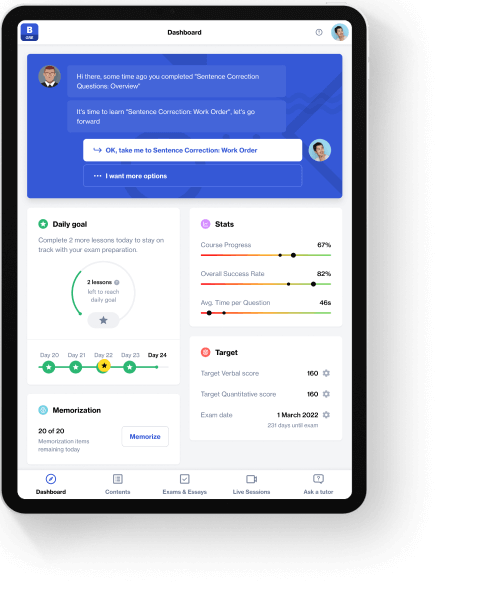Read the argument below.
Sue studied for three months for the GRE. Nevertheless, she received a low score.
What do you find odd about it?
Most Critical Reasoning questions consist of both a __premise__ and a __conclusion__. However, __Paradox__ questions are made up of two __premises__ with no __conclusion__. The two __premises__ will seem to contradict each other, creating a discrepancy, or a paradox. The __question stem__ asks you to choose an answer choice that resolves this paradox. The correct answer is a new **premise** that resolves the paradox successfully and logically.
You can easily recognize __Paradox__ questions when you see the following __question stems__:
* Which of the following, if true, best resolves the above paradox?
* Which of the following, if true, best reconciles the seeming discrepancy described above?
* Which of the following, if true, would most contribute to an explanation of the facts above?
Look at the example again.
Sue studied for three months for the GRE. Nevertheless, she received a low score.
What paradox do these two __premises__ create?
Incorrect.
This doesn't make sense as a paradox. Nothing about a lack of specified length for GRE preparation and Sue's score seems to be contradictory.
Incorrect.
This choice relies on information you don't have. How confident Sue felt going into the test isn't mentioned in the __premises__.
Nice job!
If Sue studied for three months, it stands to reason she'd be pretty familiar with the material. Yet she scored poorly. This is a paradox because the two __premises__ seem to contradict each other or not make sense.
__Paradox__ questions require you to choose a new __premise__ that explains the paradoxical statement. Which of the following __premises__ best explains the paradox between Sue's low score and the amount of time she spent studying?
Incorrect.
While it's possible that errors could exist on the test, this factor alone doesn't resolve the paradox between Sue's low score and the amount of time she spent studying. If you knew the whole test was faulty, then maybe that would be the case, but you don’t have that information.
Right!
This answer resolves the paradox by entering a third factor: the quality of her test preparation. The fact that she only studied vocabulary words rather than learning approaches to answering each question type explains the discrepancy between the score and the amount of time she spent studying. The contradiction now makes sense with this __premise__ in place.
Incorrect.
Whether Sue has been to the testing location isn't relevant to the scope of this question. This __premise__ doesn't adequately explain the gap between her study time and the score.
Now that you've had some practice, try a harder question.
Readingsworth Independent Booksellers had a tough year, having faced a severe financial crisis and nearly having to close their doors after twenty years in business. Yet their manager received a raise and a bonus at the end of the year.
Which of the following, if true, best resolves the above paradox?
Incorrect.
The manager's attitude toward the employees doesn't explain the discrepancy between the bookstore nearly facing permanent closure and the manager receiving extra compensation.
Right!
This answer fills in the discrepancy between the amount of money the manager was awarded and the financial state of the company. If the manager was responsible for saving the business, it makes sense that he or she be rewarded for those efforts.
Incorrect.
This answer might explain why the manager is getting more money, but it doesn't do so in the context of the business's near collapse. Therefore, it doesn't resolve the paradox.
Incorrect.
The __premises__ deal with the bookstore's financial state and the manager's extra compensation. The popularity of electronic reading devices is not mentioned and is thus out of scope for this question.
To sum it up:
[[summary]]
Right!
The fact that there is no __conclusion__ is indeed at odds with what you know about __arguments__.
But you would also be correct in stating that the two __premises__ seem contradictory. After all, one would expect the __premises__, which are understood as fact, to accord with each other, not contradict one another. This is something you will encounter in Critical Reasoning __Paradox__ questions. Determining what information is missing to make the contradiction make sense is the goal of __Paradox__ questions.
Correct!
The two __premises__ appear to contradict each other. Why did Sue get a low score if she was adequately prepared? Determining what information is missing to make the contradiction make sense is the goal of __Paradox__ questions.
In addition, you would also be right to think the __argument__ is odd because it does not contain a __conclusion__.
The two __premises__ seem to contradict each other.
The __argument__ does not contain a __conclusion__.
There is no specified length for how long you should study for the GRE, so she shouldn't blame herself for her poor performance.
Sue didn't expect to do poorly on the test, but she did anyway.
While there is no standard length of time to spend studying for the test, three months seems like adequate preparation, which makes it unclear why she received a low score if she studied so much.
The test included faulty questions.
Sue may have studied for three months, but her preparation was mostly spent on memorizing vocabulary words, not learning strategies for approaching the questions or breaking them down.
Sue had never been to the test center.
The manager has a tyrannical attitude toward his or her job and treats the employees badly.
The manager was single-handedly responsible for rescuing the business from financial ruin, and without his or her efforts, it would have gone under.
Many employees were laid off, leaving the manager to do most of the work, including not only running the business, but doing customer service and sales work as well.
The rise in electronic reading devices has delivered a severe blow to bookstores, many of which have closed their doors.
Continue
Continue
Continue
Continue
Continue
